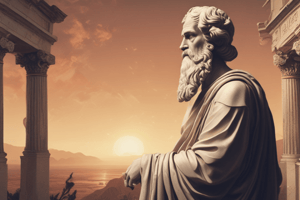Podcast
Questions and Answers
What is emphasized as a fundamental component in perceiving art?
What is emphasized as a fundamental component in perceiving art?
- The history of the artwork
- The perceiver's own judgment (correct)
- The financial value of the artwork
- The artist's background
Understanding art is primarily considered as a(n):
Understanding art is primarily considered as a(n):
- Objective assessment
- Subjective experience (correct)
- Economic investment
- Biased opinion
What does the text suggest about the role of the perceiver in judging art?
What does the text suggest about the role of the perceiver in judging art?
- Judgments are solely based on financial status
- Judgments are influenced by internal biases and preferences (correct)
- Perceiver's preferences have no impact on judgments
- Judgments are objective and universal
In terms of communication, what sets art apart from language according to the text?
In terms of communication, what sets art apart from language according to the text?
What is highlighted as a primary advantage of art in communication based on the text?
What is highlighted as a primary advantage of art in communication based on the text?
How does the text describe the nature of art's communication compared to language?
How does the text describe the nature of art's communication compared to language?
What did Aristotle see art as?
What did Aristotle see art as?
According to Plato, why is art considered dangerous?
According to Plato, why is art considered dangerous?
What is Immanuel Kant's view on the judgment of beauty?
What is Immanuel Kant's view on the judgment of beauty?
How did Aristotle differ from Plato regarding the purpose of art?
How did Aristotle differ from Plato regarding the purpose of art?
How does Aristotle view the role of art in educating its audience?
How does Aristotle view the role of art in educating its audience?
Why did Plato want to banish art with practitioners?
Why did Plato want to banish art with practitioners?
According to Plato's philosophy, what is the relationship between the physical world and the spiritual realm?
According to Plato's philosophy, what is the relationship between the physical world and the spiritual realm?
Why was Plato skeptical of art and artists?
Why was Plato skeptical of art and artists?
How did Plato view artists in 'The Republic'?
How did Plato view artists in 'The Republic'?
What did Plato consider as the true reality according to his Theory of Forms?
What did Plato consider as the true reality according to his Theory of Forms?
In Plato's philosophy, what role does art play in relation to emotions?
In Plato's philosophy, what role does art play in relation to emotions?
Why did Plato discourage the inclusion of artistic subjects in the ideal republic?
Why did Plato discourage the inclusion of artistic subjects in the ideal republic?
Flashcards are hidden until you start studying
Study Notes
Nature of Art
- Art is a non-symbolic mode of communication that serves as a counterbalance to language.
- It can be communicated with little or no prior indoctrination, allowing for experimentation with visual-emotional correlations.
- Certain colors can elicit specific feelings when combined or contrasted with other colors.
Understanding Art
- Understanding art is always a value judgment in philosophical terms, depending on the perceiver's preferences, biases, and internal possessions.
- Art is highly personal, individual, and subjective, requiring the perceiver's own judgment as a fundamental component.
- A work of art cannot be separated from the act of making it.
Jean Paul Sartre's Perspective
- According to Sartre, the role of art is to depict the world in a completely different light and perspective.
Aristotle's View on Art
- Aristotle saw art as an aid to philosophy in revealing truth, rather than a trivial alternative to actual reality.
- Art represents a possible version of reality, offering multiple possibilities of what could be.
- Aristotle believed that art serves two purposes: to experience pleasure and to guide and teach the audience about life.
Immanuel Kant's Perspective
- Kant viewed the judgment of beauty as a cornerstone of art, which can be universal despite its subjectivity.
- He realized that judgments about beauty are subjective, but based on a common criterion.
Plato's View on Art
- Plato believed that art is an imitation of another imitation, representing a trivial alternative to actual reality.
- He saw artists as imitators who should be banished from the Republic to ensure that its members' attitudes and behaviors are not compromised by art's influence.
- In his metaphysical view, things in the physical world are copies of the original, eternal, and true entities found in the World of Forms.
Studying That Suits You
Use AI to generate personalized quizzes and flashcards to suit your learning preferences.




